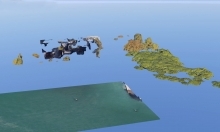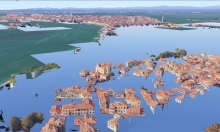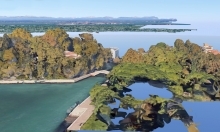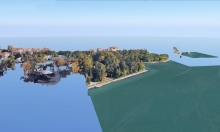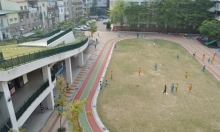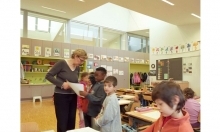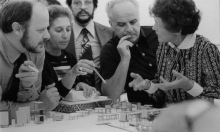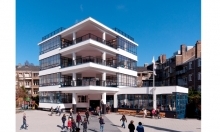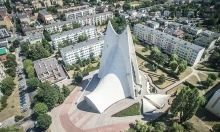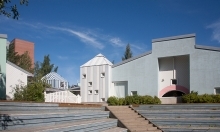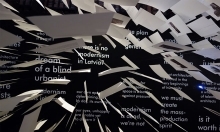Hello World?
Next year Lithuania will be represented at the 2018 Venice Architecture Biennale for the first time. This event draws an ambitious goal - a construction of a new national pavilion. The project’s concept is based on the fact that the primary biennale space is nearly built to its limits. The edge of the Giardini, the majority of parkland in Venice, is the only area where new construction may still be possible. This specific territory in Venice is the proposed location for the Swamp Pavilion. The project as action is simultaneously belligerently radical and peacefully diplomatic. On the one hand, it is a provocation regarding the expansion of national territory within the international context of the Biennale. On the other hand, the boundaries and boundedness of the place inhibit incursion onto the land area, locating the pavilion where pre-existing elements of air and water are available. In this Janus-like project, two identities become intertwined: that of a human as a representative of a particular nation with a human as a part of and cohabiting with “nature,” and therefore representing an inhabitant of planet earth.
First construction piece of the Swamp Pavilion will be the lecture series Hello World? which takes its name from the basic script that is written as the first foray into programming language. Taking inspiration from Stafford Beer’s cybernetic dream, the program of the lecture series scripts the construction process of the Swamp Pavilion to expand existing and create new perspectives on forms of representation and pedagogy. Hello World? is the twenty-first event in the series organised by the Architecture Fund that stands for building a new vocabulary across emergent discourses, calling for criticality and ethics in the time of crisis and post-truth. Starting in fall 2017, seven invited speakers will engage the audience at the National Gallery of Art in Lithuania by presenting their research to push boundaries of discipline, interrogate discursive forms of architectural practice, and produce new spaces for alternative imaginaries.
Curators of the Swamp Pavilion: Nomeda and Gediminas Urbonas.
Curator of the talk series: Andrius Ropolas.
Illustrations by Laimonas Zakas.
Project is presented by: Lithuanian Council for Culture and Ministry of Culture of The Republic of Lithuania..
Partner: National Gallery of Art.
The talks are held at the National Art Gallery (NDG), Konstitucijos av. 22, Vilnius, 8.00 p.m. The talks will be held in English and Lithuanian. Entrance is free of charge.
ARCHITECTURE OF EDUCATION: COMMUNITIES AND INNOVATIONS
In 2015, the Architecture Fund and the Architecture Faculty, Vilnius Gediminas Technical University, organised the first round of lectures on educational architecture dedicated to the problems of creating educational spaces. During this course, five speakers from the Netherlands, Germany, United Kingdom, Italy and Belgium presented their experiences, achievements and challenges related to the architecture of educational spaces. (http://www.archfondas.lt/en/discussion/archive/2015)
This event has encouraged examination of the experiences of the old Wwestern democracies and extensive debates among architecture, education and public administration specialists responsible for the development and transformation of educational environment, as well as interested representatives of local communities. A lot of attention was paid to the coherence between architecture and learning paradigms, and their transformations.
In continuation of the analysis made on the issues related to the changes of educational architecture, a new round of the Architecture [Discussion] Fund, the 22nd series of talks, is planned to discuss the role of the city, state, school, university communities and the private participation in the development and administration of schools, their networks and university campuses more extensively.
Curators: Liutauras Nekrošius, Edita Riaubienė, Dolf Broekhuizen
Poster illustrator: Aurimas Gaižauskas
The 22nd series of talks of Architecture Fund are supported by Lithuanian Council for Culture, Tarkett, Embassy of the Kingdom Netherlands
The talks are held at 8.00 p.m. at the National Art Gallery (NDG), Konstitucijos av. 22, Vilnius. Entrance is free of charge. The events are recorded and the videos are placed online at www.archfondas.lt.
The conversations are arranged in collaboration with VGTU Faculty of Architecture.
POST-ARCHITECTURE
The second half of the 20th century was marked by extraordinary socio-political, socio-economic and socio-cultural turning points: the end of the Cold War, consolidation of capitalism and globalization, extreme development of information technology, to mention a few. The period was also significant as the ending of certain powers, different phenomena and paradigms, which at first seemed immovable, such as Socialism, Colonialism and Modernity. All this simply could not pass over the architecture and its expression concepts on broader cultural field. Recently architecture is often analyzed in the contexts of post-socialism, post-colonialism and post-modernism. This series of talks is intended to figure out, how the transformations of the second half of the 20th century have influenced the development and state of architecture, with a special focus on the Eastern European region. This 20th series of talks will present architects, resarchers, academics who will share their insights on the phenomenon of POST – architecture of the late 20th century.
Curators of the series: Tomas Grunskis and Martynas Mankus.
Poster illustration: Andrew Kovacs, Plan for a City, 2011.
The 20th series of talks of Architecture Fund are supported by Lithuanian Council for Culture, Polish Institute in Vilnius, Aco Nordic, Alucobond, Cembrit, Schindler, Tarkett, Velux.
The talks within this series are planned in April – May 2017 at the National Art Gallery, Konstitucijos av. 22, Vilnius.
Entrance is free of charge. The talks will be held in English and Lithuanian. The events are recorded and the videos are placed online at www.archfondas.lt.

